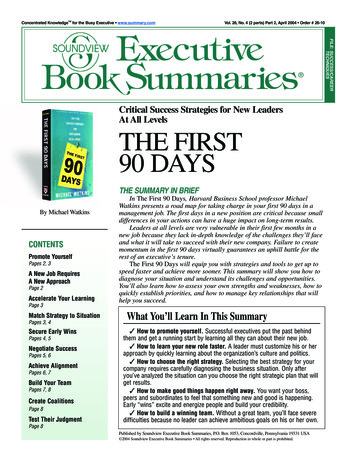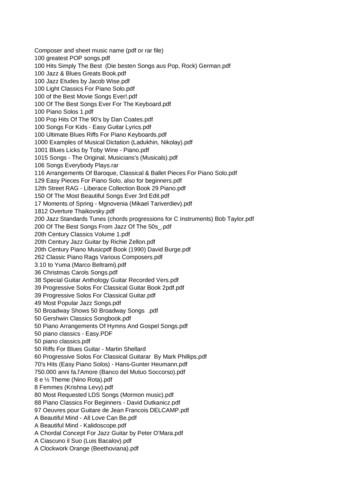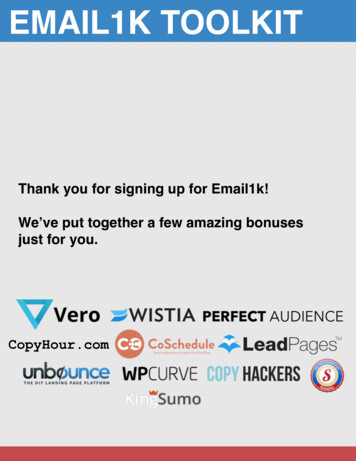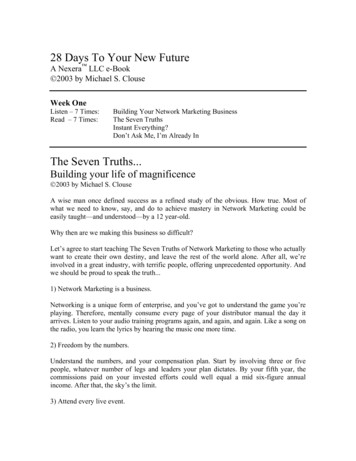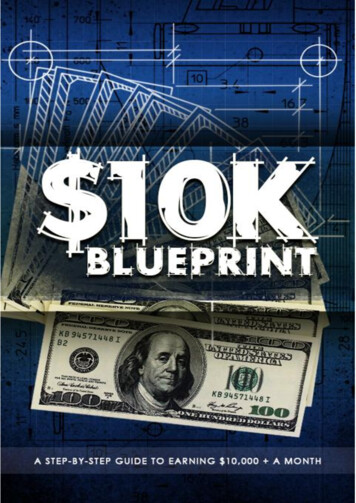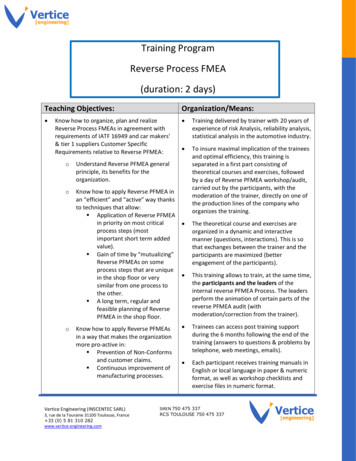
Transcription
Your first 100 days in positionintelligentexecutive.com
Your first 100 days in positionintelligentexecutive.comHow you can better approach your intelligentfirst 100 daysexecutive Introduction Presenting yourself Building your network02Page 03intelligentexecutivePage 04Page 05 - 06 Meeting expectationsPage 07 Setting Personal Objectives and Development PlansPage 08 Specifics for CXO levelPage 09 - 10 Pre-requisites for Sales leadership & senior salesPage 11 - 15Copyright 2013. An Intelligent Executive white paper from Armstrong Hall.
Your first 100 days in igentexecutiveThe first 100 days of employment within any business represents a goldenopportunity to make a positive impact, cement your place in the organization andbuild a platform for ongoing success. By day 101 you could be sitting on top of theintelligentworld.executiveAlternatively, in that first 100 days you could relegate your future career with theorganization to ‘catch-up’ mode. Even worse, some people will manage to kill theirfuture prospects with an organization even before they get their seat warm.Some things in your overall to-do list will be more important than others, but bythe end of the first week you should have a plan in place for the first 100 days thateither captures all of the following elements, or allows you to cross any of them offfor a well-founded reason.In this article we outline what’s considered best practice – derived from originalresearch sourced from business leaders, management & leadership trainers andperformance & career coaches. In addition, we have included an addendum forthose people assuming sales leadership and senior sales roles in which performancecan be more clearly identified – and some additional insight to maximise chances ofgetting off to a successful start and avoid placing yourself at early risk.This white paper should be beneficial both to the person into whom thenew hire reports as well as the new hire themselves.Copyright 2013. An Intelligent Executive white paper from Armstrong Hall.03
intelligentexecutive.comYour first 100 days in positionintelligentPresenting yourself - first impressionscountexecutiveYou are about to be introduced to more people than you can possibly rememberthe names of — colleagues (higher, lower and peers within the structure), teammembers, subordinates, internal customers, potential friends, future allies, possibleintelligentcritics and opponents, competition for promotion, supporters, externalpartners andexecutiveclients.The first impression you make will pass around the building and from one office toanother a lot quicker than you will. Accurate or inaccurate, positive and negative,your picture can be painted oh so many times, and embedded into people’s mindsbefore you have had a chance to eyeball them and shake hands. It may only bepersonal perspective rather than the reality but perception counts!Prepare for meeting and greeting. You need to fit in, you need to belongapart from being a trait of our personal make-up to seek affiliation andto feel wanted, you can only successfully build that all important internalnetwork when you are really inside the organization.You can then make the critical decisions around, who you want or need as an ally,who is useful, who isn’t, who is important in the chains of which you are a part,whose word counts, and who are the key decision makers. , etc.Consider how others perceive you. At senior exec levels you need tobe aware of your personal branding — “brand you”. Dress to impress:you need to look the part. Do you know what the acceptable dresscode is? What observations can you draw from people you saw whilstinterviewing with the company? If you don’t know, play it safe and beconventional (neutral), you can move style-wise when you are familiar.04Copyright 2013. An Intelligent Executive white paper from Armstrong Hall.
Your first 100 days in positionBuilding your eThe people who are responsible for your appointment are likely to be closely involvedwith you in the first few days. They will naturally be looking for confirmation thatthey have made the right choice. The more you can say and do that meets theirintelligentexpectations, and gives them confidence in having made the right appointment,theexecutivemore relaxed they will be in their dealings with you.The more you know about the organization before you go in, the more you will beable to engage with your new colleagues. Being introduced to a new colleague andsaying, “Ah Sam, am I right to assume that you will be doing the procurement forXYZ project?” is a far better ice-breaker than asking how long Sam has been withthe Company.Plan introductions!Be smart about how you engage conversations with key stakeholders.If a new colleague is going to be crucial to your team, getting them on-side with acomment such as, “Ali, I am looking forward to sitting down with you to talk aboutyour ideas for the new budgeting process”, or “Ali, I would be really interested inseeing your evaluation of the ABC proposal”, is much more engaging than somebanal generality. It also sets a tone for the working attitude — “let’s get things done”.The person walking you round for introductions, probably your own manager, is alsomore likely to be impressed. It’s all in the preparation.Over the first few weeks, there will be people internally that you need to engagefully with, whether they be your boss / superiors, team members / peer groups,internal customers, sources of important information or key operational interfaces.As you build your understanding of your own role and objectives, theirsignificance to your successful achievement should become evident, somake tactical decisions about how to win them over to provide the core ofyour network.Like you, they are driven by their personality traits, values, motivation, competencies,etc. and will perform to their strengths.If managerial accountability sits with you, the extent you will succeed with youragenda can be hugely impacted by your team.Copyright 2013. An Intelligent Executive white paper from Armstrong Hall.05
Your first 100 days in vetryingto get a levelInvesting in some analysis of these people andunderstanding will inform your judgements and decision making.ofintelligentexecutiveAll the while others will be doing their own assessment of you. Yourlevel of selfawareness will be crucial in getting things right, because like it or not, you are undera microscope.Externally there will be a broader eco-system with which you interact, such aspartnering organizations and clients who you will need to engage with early in thegame. However, you need to be in a position of knowledge before you engage withthem. You need to be clear about the nature of the business relationship – insofaras you can establish what they need from you and what you will need from them.It is very easy to go on a whirlwind tour of everyone that you will be dealingwith but it is far better to have the introductory conversation when you areat least fundamentally equipped with an understanding of the key natureof the business relationship and any issues that exist.When you know what you need to achieve, you can then have a conversation withexternal stakeholders where any move beyond passing pleasantries would see youin an informed position, rather than caught flat-footed.For those people whose role on behalf of the organization will have a significantexternal perspective, such as sales, getting to grips with your territory must featurehigh on your 100 day plan. For the Project Manager in a Joint Venture or partneringarrangement, understanding the commercial and contractual arrangements inplace is as vital as appreciating the informal workings of the joint organization.06Copyright 2013. An Intelligent Executive white paper from Armstrong Hall.
intelligentexecutive.comYour first 100 days in positionMeeting expectationsintelligentexecutiveAt interview, it is most likely that you will have gleaned some perspective of theexpectations of the organization for the role, both generalities and some key areasof focus.intelligentexecutiveThe generalities may be found in the more day-to-day aspects of the role thattypically would be found in a job description.There will also be the more transformational expectations of the businessthat often form the big challenges of the role.However, it is essential that you establish the real focus of the role. What is said orinferred at interview and the expectation that is created on either side can actuallyresult in a lack of congruence when these things are discussed in detail. Suchexpectations need to be defined so you have a clear picture of what lies beforeyou and what needs to be achieved. The key player in this will be your immediatemanager.It is important that your personal objectives and targets are definedand agreed, early.However, to establish SMART objectives (Specific, Measurable,Achievable, Relevant, Timebound) requires an informed positionfor you and your manager, and this may take some time and anumber of meetings.Objectives for all employees generally sit within a companytimetable for the performance management process, so youmay very well be starting your new role a long way intothat defined period. That needs to be taken into accountin developing your personal objectives and in anycontribution to defined team targets.Copyright 2013. An Intelligent Executive white paper from Armstrong Hall.07
Your first 100 days in tting personal objectives and developmentexecutiveWithin your first week, have the first meeting to discuss your role and the businessexpectations of you.intelligentexecutiveAgree some principles around the areas where your key objectives need tobe so that their development and definition can begin.Aim to have them agreed within the first month but do not finalise them untilyou are sufficiently informed from your time within the organization to make themSMART and to know that they meet with the wider organization objectives.SMARTSpecific Measurable Attainable Relevant Time boundTheir impact should be meaningful and visible to those that matter within thebusiness that you are seen and acknowledged as a high performer within the biggerpicture. If you have set the hurdles too low, what at face value may look like a greatperformance will do your credibility no favours — and that credibility is necessaryto underpin your career advancement within the organization. Agreeing unrealistictargets will just set you up for a fall. That is why the whole exercise needs time andenergy devoted to it.Let us stay on the subject of personal objectives, as these will undoubtedly beused to measure your success and future potential, and also bring your personaldevelopment into the picture.Regardless of your role within the business, take a commercial perspectiveof the value you add to the business. If you can’t articulate the differenceyou will make to the bottom-line, regardless of whether you are operationalor in an enabling function, then you will not make an impact on theorganization, no matter how much endeavour the activity requires.The fact of the matter is also that your personal objectives should stretch you interms of performance, and help you develop and grow you as an individual and asa player in the organization. Be clear about the personal development you requireand build it into a plan.More and more organizations also measure you not just on what you achieve buttake account of how you achieve it, so be clear about the cultural influences withinthe organization — understand how they play the game and ensure you play bytheir rules.08Copyright 2013. An Intelligent Executive white paper from Armstrong Hall.
intelligentexecutive.comYour first 100 days in positionintelligentTen principal guidelines for “C” levelexecutiveexecutiveleaders / senior managersThe people who appointed you, the exec team or the board, will be looking for youto produce results and once beyond the honeymoon period they’llintelligentbe looking forexecutivethose results.They will be looking for a meaningful contribution. In the early days you will havecost them time and money and you need to determine what your break-even pointis (consider impact / outcomes and timescales) and move beyond this, to become asignificant net contributor.1. Do not assume that your interpretation of what is expectedof you is correct.Immediately on starting clarify your purpose with the stakeholders and businessowners by making a succinct list of objectives and an action plan. Remain in closecontact with the stakeholders to ensure clarity over goals and expectations. RobertTearle, Director at Arena Search & Selection, who has 20 years head-huntingexperience into “C” level positions worldwide, says“If you ask bosses and employees what is expected of the job holder, alltoo often you get different answers. Focus on right issues from the outsetbefore you’ve missed your chance to excel and before it’s too late.”2. The most important thing (from an executive point of view)is to assess what needs to be done to achieve the corporateobjectives for which you have been hired– says Andrew, CEO, Fortune 100 corp. Consider the following: What are the critical financial objectives to be realised? Is the current strategy correct and effective? How can you close the gap on any shortfalls? Do you have the right people — who do you need to retain or replace? What changes do you need to push through and why? If you do not set your agenda here in the first 3 to 6 months, youmay end updancing to somebody else’s tune and this could lead to failure.3. Connect officially or unofficially with yourpredecessor to gain insight.Copyright 2013. An Intelligent Executivewhite paper from Armstrong Hall.09
Your first 100 days in positionintelligentexecutive.comintelligent4. Meet the management team as a group andindividually andexecutivelook for any common themes— says Stephen Branley, Founder, Branley Consulting. Try to get them on board by sharing information about yourself with the team,intelligentand telling them how you like to manage.executive Then meet people individually to find out what they like and dislike about theirjobs as well as finding out ways they think the business can be run better —establish any common themes.5. Ask for “state of the nation” presentations from yourmanagement team.Ask them to list their top 5 business issues and to propose solutions to these.Synchronise objectives in terms of short term goals i.e. 30, 60 and 100 days, anddiscuss 1, 2 and 3 year business plans with the senior leadership team.6. Stop the practices that are not working and carry on withthose that are. Initiate new practices to fill any gaps.7. Look for quick wins with maximum business impact.Start considering what major changes could have a transformative effect — butbe careful to avoid jumping to conclusions too soon on big issues. Consider theMcKinsey way - a deep root cause analysis underpins their approach to projects andre-engineering. Make sure you are addressing the right issues.8. Synergize the team and with the team.Build a culture of collaboration and develop lines of communication. Take plenty oftime to listen and connect with your team and staff.Empower your team and create opportunities for others to lead – distributedleadership can be a wonderful thing. At executive management level the decisionthat you make affects people around you so it’s important that you let them knowthat you care. Do not alienate yourself and don’t get fired because you’ve failed tofit in.To get off to the best possiblestart, the ideal is to start planningyour approach to the role inadvance of your start date. Atsenior levels it is not unusual forthe new hire to have discussionsin person and or on the phonewith their boss/s prior to officiallycommencing in the position.109. Meet your top 5 customers or business partners.10. Mind the gap.It’s not unusual for those changing their environment to bring with them perceptionswhich are incorrect, or out-dated. There’s a difference between similar and same. Askthe people who hired you, including HR, what perceptions you may need to changeand what knowledge gaps you need to bridge — says Jezz Moore, performancecoach at zoomcow.co.uk who has coached business leaders at such organisationsas Tesco,TNT, DWP and national rugby & rowing teams Copyright 2013. An Intelligent Executive white paper from Armstrong Hall.
intelligentexecutive.comYour first 100 days in positionintelligentTen principal guidelines for Sales leaders/ Salesexecutivemanagers in their first 100 days1. Do not assume that your interpretation of what is expectedintelligentexecutiveof you is correct.Immediately on starting clarify your purpose with the stakeholders and businessowners by making a succinct list of objectives and an action plan. Remain in closecontact with the stakeholders to ensure clarity over goals and expectations. RobertTearle, Director at Arena Search & Selection, who has 20 years head-huntingexperience into “C” level positions worldwide, says“If you ask bosses and employees what is expected of the job holder, alltoo often you get different answers. Focus on right issues from the outsetbefore you’ve missed your chance to excel and before it’s too late.”2. Do not get distracted – it’s all about revenue.100 days of focus on deals will not be wasted; nothing sets out your expectationsto your sales people more clearly than deal and pipeline scrutiny – says Jim Close,SVP of Software AG.3. Establish what needs to happen to hit the targets.4. Put yourself out there!Get out and meet customers with salespeople to develop better customerinsight and understanding of your sales team members.5. Is there a winning formula and if so, is it beingrepeated?If not, put it into action. Whilst doing this, go in with open eyes anddon’t jump to conclusions. What you are being told, or what youthink is happening, may not be 100% correct. Too often plans arebuilt on the wrong assumptions. Identify your SWOT situation.Revered management consultants McKinsey always dig deep,right to the root cause, to make sure actions are taken on theright foundations. In start-up mode focus on actions to drive thenumbers and keep your eyes open.Copyright 2013. An Intelligent Executive white paper from Armstrong Hall.11
Your first 100 days in positionintelligentexecutive.com6. Establish who are the winners and losers intelligenton the team.executiveWhich salespeople on the team are the real contributors and who’s not pulling theirweight? Determine who can be turned around and who cannot and formulate aplan to remove dead weight fast!intelligentexecutiveWho are the “A” players (top 20%), who are the “B” players (majority) andwho are the “C” players (bottom 10%).When determining who the good people are and those who are not — seek broadopinions.Some poor people may have got lucky and, conversely, unlucky ones may be thosewith the best potential. Seeking broad views (inside & outside of your dept.), mayhelp you identify how you can get the best out of your team and develop a processto make them and the business perform better.7. By the end of your first 100 days, you should be able tounderstand the whole picture.8. Look at current operations.9. Ask a lot of questions within the group.Let people know what you are thinking, and most importantly, ask staff what theywould like to see improved. Your curiosity should extend beyond sales. Talk to headsand others in aligned business units, to find out what they see as external andinternal issues – and consider SWOT analysis.10. Mind the gap.It’s not unusual for those changing their environment to bring with them perceptionswhich are incorrect, or out-dated. There’s a difference between similar and same.Ask the people who hired you, including HR, what perceptions you may need tochange and what knowledge gaps you need to bridge — says Jezz Moore,performance coach at zoomcow.co.uk who has coached businessleaders at such organisations as Tesco, TNT, DWP and national rugby& rowing teams 12Copyright 2013. An Intelligent Executive white paper from Armstrong Hall.
Your first 100 days in positionintelligentexecutive.comintelligentTen principal guidelines for seniorsalespeopleexecutiveselling complex / big ticket solutions in their first100 days.intelligent1. Do not assume that your interpretation of what executiveis expectedof you is correct.Immediately on starting clarify your purpose with the stakeholders and businessowners by making a succinct list of objectives and an action plan. Remain in closecontact with the stakeholders to ensure clarity over goals and expectations. RobertTearle, Director at Arena Search & Selection, who has 20 years head-huntingexperience into “C” level positions worldwide, says“If you ask bosses and employees what is expected of the job holder,all too often you get different answers. Focus on right issues from theoutset before you’ve missed your chance to excel and before it’s too late.”2. Develop and maintain a sense of urgency— says Nick Holbrook, RVP EMEA at The Complex Sale. This applies to creating/generating selling opportunities and to moving them through the sales cycle.Complex sales involve long selling cycles. In a world with quarterly objectives, inmany cases quarterly targets and an ever watchful management eye, the salespersonneeds either to be doing the numbers or at minimum must be seen to be taking theright initiatives.This is particularly important for the new hire, who has not yet proven himselfor herself. A smart salesperson should look to be ahead of the game, taking theinitiative and doing things early not late. This should include looking for ways tobring actions, events and decisions forward both externally and internally. Not onlywill this maximise their chances of early success during the period in which the eyesare most likely to be on them but it will also help them counter any unexpecteddelays.3. Few salespeople fail because they have too manyopportunities,however, many fail because they have too few.Copyright 2013. An Intelligent Executive white paper from Armstrong Hall.13
intelligentexecutive.comYour first 100 days in position4. Is there a winning formula and if so, whatintelligentis it and can youexecutivereplicate it? Who are the most successful salespeople in the team and why? Which customer types have seen the most value from your solutions? What have been the compelling events which have brought aboutintelligentsales?executive What are the reasons customers have not gone ahead? If you have not done so already, now consider your ratios.What is your annualtarget?What is an average ordervalue?How many proposalstabled areconverted to sales?How many 1st meetingsprogressto a proposal stage?How many customermeetings doyou need to get?How can this best workfor you?5. You need to understand your company’s propositions.Bear in mind that, at interview, it’s unlikely you were told the story “warts and all”.Work out what your employer does best and target your team to sell that. Lesssuccessful people sell what appeals to them or what customers want. This may notbe something their company is unable to deliver easily. Go back to basics. Consider the needs and issues of the marketplace you areselling into, and in turn, the marketplace they are selling into. What are the drivingfactors now and what will they be downstream? What’s your value proposition? Consider the value you believe you may bebringing to them, the benefits and what magnitude these may be, and how theymay be calculated. What would an ROI look like and why, and what evidence isthere to support this? You need to develop industry and proposition knowledge — considerbreaking down these topics into sections and sub sections, and look to buildknowledge accordingly.You may wish to brain-storm this using a mind map and a tree or indeedseveral trees (tree, branch, stem, leaf) . Or perhaps a table.Using this approach you could determine your knowledge and any gaps in it. Present your understanding of the company’s offerings in the next salesmeeting. Presenting is one of the best ways of learning plus it will get you thinkingmore. When giving the presentation, the team are likely to give you support andconstructive feedback. Map out the sales cycle and check around to see how this plays out inreality. Speak with your boss, peers and people in other departments such assales or bid support, marketing, or customer services etc.14Copyright 2013. An Intelligent Executive white paper from Armstrong Hall.
intelligentexecutive.comYour first 100 days in positionintelligentexecutive What elevator pitches do you need and what do they look like?6. Develop your toolkit. Develop a question bank. What key questions will you, without exception, ask thecustomer or prospect and in what order? What case studies and return-on-investment can you offer up? intelligentexecutive Bring the best people internally on-side so that you can field an “A” team whenbidding. You need to know the process of your organisation, what they can handle(how and how quickly), and also, importantly, what they are unable to do.7. Mind the gap.It’s not unusual for those changing their environment to bring with them perceptionswhich are incorrect, or out-dated. There’s a difference between similar and same. Askthe people who hired you, including HR, what perceptions you may need to changeand what knowledge gaps you need to bridge — says Jezz Moore, performancecoach at zoomcow.co.uk who has coached business leaders at such organisationsas Tesco, TNT, DWP and national rugby & rowing teams 8. You will be more successful if you understand thecompetition— says Yvonne, #1 salesperson globally at a Top 3 comms vendor. Who are yourcompetitors? What are their strengths and weaknesses? In addition to askingcolleagues, ask people who have worked for the competition – the answers are notalways what you might expect.9. When meeting existing customers, listen hard, find out firstand avoid jumping to conclusions.Be aware that they may know more about your company and your propositionsthan yourself. They may have historical complaints or old promises thathave been made but not delivered on. Both represent an opportunityto establish a new relationship.10. Develop a support network in the managementteam.In big ticket sales it’s not unusual for sales cycles to take upwardsof 9 months, so in a start-up period you may have sold very little.In the event of your immediate manager leaving, or of a reviewor re-organization, you may need management level sponsorshipif your position becomes at risk because you may not yet haveproven yourself.Copyright 2013. An Intelligent Executive white paper from Armstrong Hall.15
Building your network Meeting expectations Setting Personal Objectives and Development Plans Specifics for CXO level Pre-requisites for Sales leadership & senior sales Page 03 Page 04 Page 05 - 06 Page 07 Page 08 P

